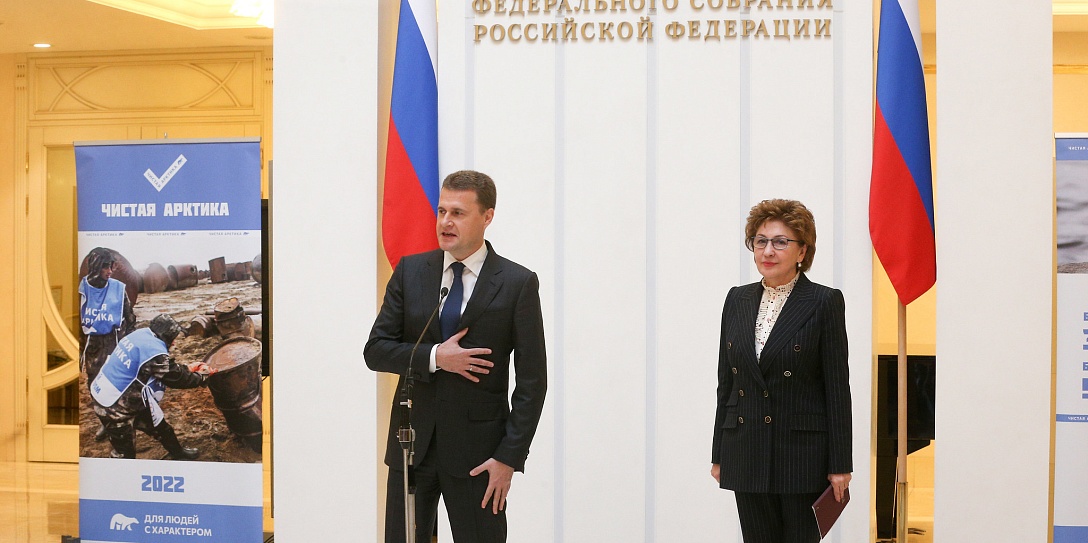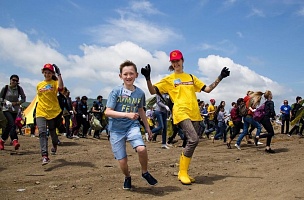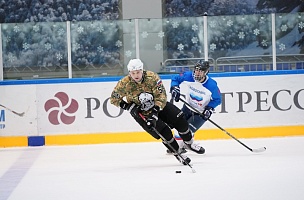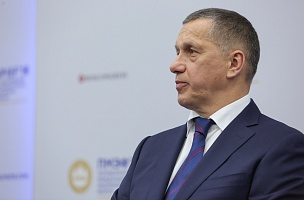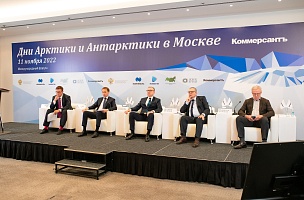The results of the Clean Arctic public project were presented to Russia’s Federation Council in the format of the photo exhibition ‘The Arctic: For People with a Strong Spirit’. Minister for the Development of the Russian Far East and the Arctic Alexey Chekunkov and Deputy Speaker of the Federation Council of the Federal Assembly of the Russian Federation Galina Karelova took part in the opening ceremony and the presentation of awards to the most active volunteers of the project.
Over the two years that the Clean Arctic project has been implemented in nine Arctic regions, more than 3,000 volunteers from different regions of Russia and other countries have collected and prepared roughly 5,000 tonnes of waste for processing. The scale of this work was praised by members of the Council for the Development of the Far East, the Arctic, and Antarctic under the Federation Council, who discussed ways to improve legislative support for the delivery of goods to the Far North during the meeting.
Karelova noted that the Clean Arctic project is an important and emblematic project of how to bring public initiatives, the state, and business together in order to achieve a key goal — cleaning up waste in the Arctic.
«I would like to note the high level of government, corporate, and public involvement in the environmental agenda of the Russian Arctic. The Clean Arctic project is becoming larger and more efficient each year and attracting more and more people who are concerned about the problem of pollution in the Arctic territories. I am certain that with such a team of like-minded people, the project has a great future,» she said.
For his part, Chekunkov stressed the importance of developing the volunteer movement and thanked the project participants.
«In the coming decades, Russia will develop its technology and power, but this all rests on the feelings, energy, readiness, and will that Arctic volunteers demonstrate. The most important thing is that the Clean Arctic project is voluntary. There is no decree as important or strict as a person’s internal will and commitment to oneself. May this willingness to work together from Murmansk to Anadyr, including with volunteers from countries that are friendly to Russia, be reflected in our Arctic. Your work is among the most valuable: you set an example for giants — the government and large companies. Such energy can move mountains, or in the case of the project to clean up the Arctic, remove these mountains of waste,» Chekunkov said.
During the opening ceremony of the photo exhibition, the Federation Council, the Ministry for the Development of the Russian Far East and the Arctic, and the Ministry of Natural Resources and Environment of the Russian Federation presented official certificates of gratitude to the participants and partners of the Clean Arctic project. The leaders of the Clean Arctic project expressed special gratitude to the partner companies that helped organize expeditions to the most remote corners of the Far North. Such companies include MMC Norilsk Nickel, Rosatom State Corporation, PhosAgro Group, and Russian Railways.
The first Russian Forum—Festival ‘The Arctic. The Ice Has Broken’ was held in August 2022 as part of the plan of events of Russia’s chairmanship of the Arctic Council in 2021–2023 with the support of Clean Arctic project. The forum and festival brought together volunteers from all regions of Russia, who held discussions with representatives of various agencies and organizations about how to preserve the environment, restore the unique nature of the Arctic, and gain the practical skills needed for life beyond the Arctic Circle.
Environmental protection, including issues concerning climate change, is among the priorities of Russia’s chairmanship of the Arctic Council in 2021–2023. Given the rapid climate change in the Arctic, which can be seen in the degradation of permafrost and the emission of gas hydrates, among other things, Russia views its primary tasks as mitigating the negative effects of climate change, helping adapt daily vital activities and ensure resilience to its consequences, preserving and restoring the environment, sustainably using natural resources, maintaining the health of Arctic ecosystems, including the marine environment, and preserving biodiversity, in particular, migratory bird species. The Roscongress Foundation manages the events of Russia’s chairmanship of the Arctic Council.


